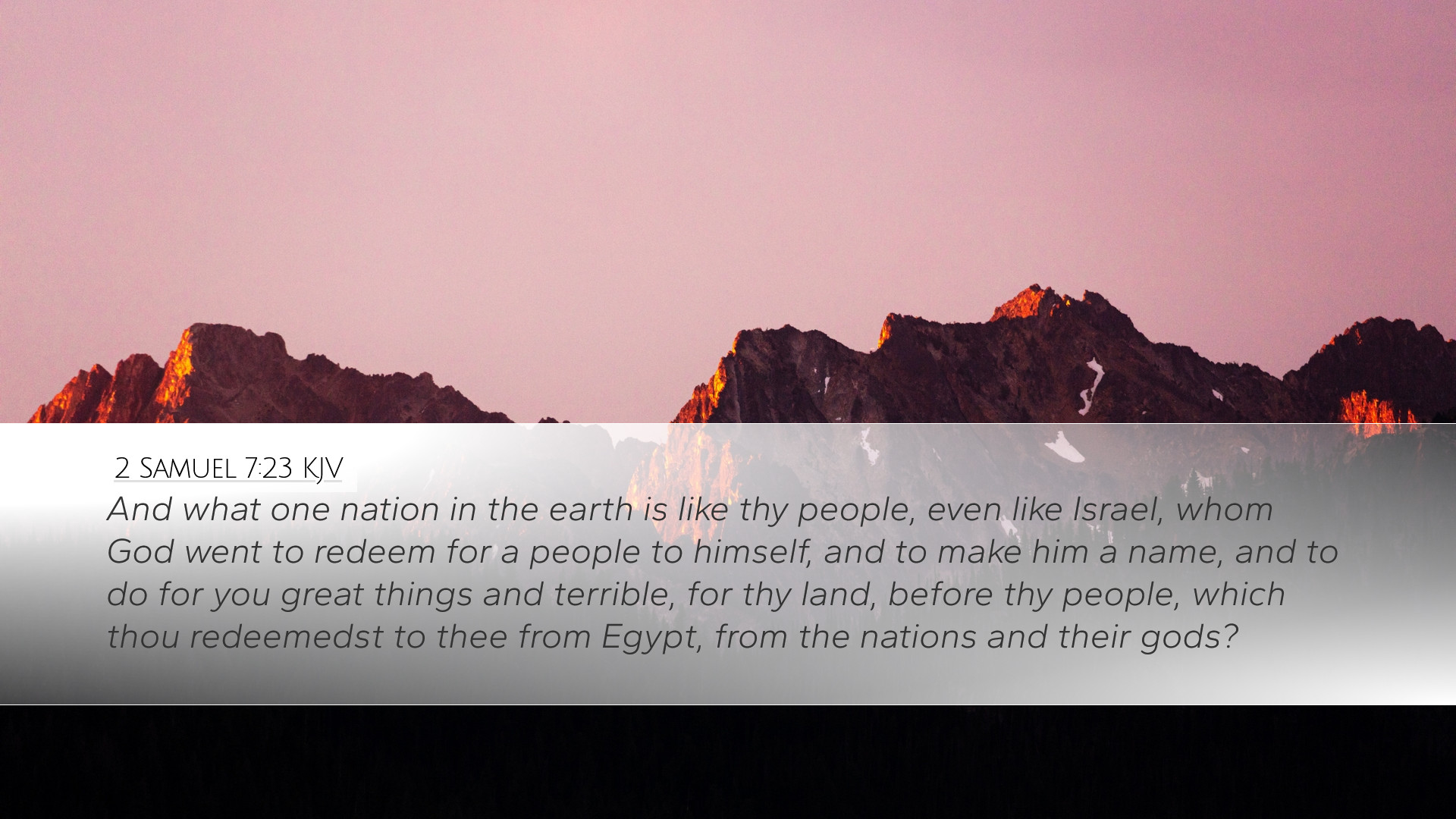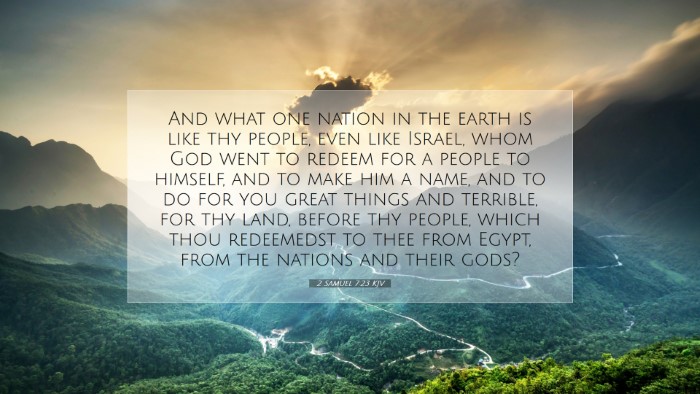Commentary on 2 Samuel 7:23
Bible Verse: "And what one nation in the earth is like thy people, even like Israel, whom God went to redeem for a people to himself, and to make him a name, and to do for you great things and terrible, for thy land, before thy people, which thou redeemedst to thee from Egypt, from the nations and their gods?" (2 Samuel 7:23, KJV)
Introduction
This verse serves as a pivotal moment in the narrative of God’s dealings with Israel. It emphasizes the unique relationship between God and His chosen people, Israel. This commentary synthesizes insights from various public domain scholars such as Matthew Henry, Albert Barnes, and Adam Clarke, highlighting the theological significance of God's covenant and His redemptive acts.
The Uniqueness of Israel
Matthew Henry notes that this query underscores the exceptional position of Israel among nations. No other nation was called to such covenant fidelity or witnessed the miraculous works that God performed on their behalf. Henry highlights that this special status was not due to any merit of the Israelites, but rather God’s sovereign choice and grace.
Albert Barnes elaborates on the idea that the nation of Israel was chosen to represent God’s glory on earth. He emphasizes that their redemptive history—a journey from slavery in Egypt to becoming a nation of prominence—reveals God’s purpose of showcasing His power and establishing His name among the nations.
Redemption and Covenant
This verse reflects Israel's redemption as a central theme. Adam Clarke explains that the term "redeem" involves not just liberation from slavery, but signifies a special relationship where God took them as His own, molding them to reflect His glory and righteousness. Clarke emphasizes that this covenant relationship was foundational for Israel's identity and destiny.
- Redemptive History: The historical narrative of Israel is steeped in God's redemptive acts. Every event from the Exodus serves to showcase God's commitment to His covenant people.
- Covenant Identity: The covenant formed with Abraham, Isaac, and Jacob was perpetuated through Moses, illustrating God's long-term relational commitment.
The Name of God
The latter part of the verse mentions God's intent to make a "name" for Himself through Israel. Matthew Henry points out that this is a declaration of God’s sovereignty and might, aiming to establish His name among the nations through Israel's accomplishments and characteristics. Henry underscores that God’s reputation was intertwined with the fidelity and success of His people.
- Manifesting Divine Glory: God's acts towards Israel were designed to reveal His character and glory to the world.
- Great and Terrible Acts: The phrase "great things and terrible" suggests that God's interventions are awe-inspiring and lead nations to respect and fear the God of Israel.
Israel's Distinct Role
The question posed in 2 Samuel 7:23 serves to reinforce Israel’s unique destiny. According to Albert Barnes, this verse captures not only Israel's role as God’s chosen ground for His presence but also emphasizes their responsibility to live in a way that honors this unique position.
- Responsibility of Holiness: With such a high calling comes the need for Israel to pursue holiness and faithfulness to God's commands.
- Witness to the Nations: Israel was tasked with being a light to the nations, a role that calls for distinction in worship and behavior.
Theological Reflections
This verse carries profound theological implications. It not only speaks to the identity of Israel but also foreshadows the coming of Christ, who would fulfill the promises made to Israel. As Adam Clarke points out, the redemptive framework established in the Old Testament is fulfilled in the New Testament, where Jesus redeems not just Israel but all of humanity.
- Foreshadowing Christ: The redemption narrative finds its completion and extension through Christ, who embodies the promise and fulfills God's purpose for His people.
- Universal Implications: While Israel enjoyed a unique position, the grace of God extends to all nations through belief in Jesus Christ, expanding the covenant blessings beyond Israel to all believers.
Conclusion
2 Samuel 7:23 encapsulates the extraordinary relationship between God and Israel, emphasizing the themes of redemption, covenant, and divine sovereignty. As we reflect on this passage, we recognize the profound implications it holds for understanding God’s character and His plans for humanity. Through Israel, God reveals His glory and sets forth a narrative that culminates in the redemptive work of Christ. Pastors, students, theologians, and scholars are encouraged to delve deeply into this text, discerning its layers of meaning and its relevance for continuing to live out one’s faith in light of God’s faithful actions throughout history.


